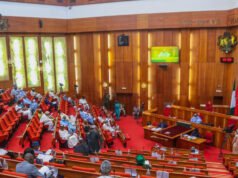Nigeria Approves N142 Billion for Six Modern Bus Terminals to Revolutionize Road Travel
The Federal Government is set to dramatically overhaul Nigeria’s interstate road transport system with a landmark investment of N142 billion. The Federal Executive Council (FEC) gave its approval on Wednesday for the construction of six state-of-the-art bus terminals, one in each of the nation’s six geopolitical zones.
This significant project has been awarded to Messrs Planet Project Limited, a firm renowned for its transformative work in the transport sector, most notably the iconic Oshodi Transport Interchange in Lagos. The announcement was made by the Minister of Transportation, Said Alkali, following the FEC meeting, which was presided over by President Bola Ahmed Tinubu.

This initiative marks a pivotal shift in the government’s approach to transport infrastructure, moving beyond simply constructing roads to developing the critical facilities that support safe and efficient travel upon them. It is the first major federal intervention of its kind by the Ministry of Transportation aimed directly at improving the experience of millions of daily commuters.
From Chaos to Comfort: The Vision Behind the Terminals
For decades, many of Nigeria’s interstate motor parks have been characterized by chaos, congestion, and a lack of basic amenities. The Minister of Transportation, Said Alkali, noted that the absence of purpose-built, organized terminals has directly contributed to higher rates of crime, an increased risk of road accidents, and general insecurity at these informal parks. Travelers often have to contend with aggressive touts, poor sanitation, and little to no security, making journeys stressful before they even begin.
This N142 billion project aims to replace that reality with a new standard of safety, comfort, and efficiency. The vision is to create organized hubs that function like modern airport terminals. Based on the contractor’s previous projects, Nigerians can expect facilities equipped with:
Secure, comfortable waiting areas to protect passengers from the elements.
Centralized ticketing stands to eliminate fare inconsistencies and the influence of touts.
Clean and accessible restrooms.
Designated loading and unloading bays to create an orderly flow of vehicles.
Driver’s lounges where long-distance drivers can rest properly, improving road safety.
High-tech surveillance towers and security personnel to ensure passenger safety.
By creating these organized environments, the government aims to drastically reduce crime and make interstate travel a more dignified and secure experience for everyone.
Strategic Locations to Connect the Nation
The locations for the six terminals were carefully selected based on their economic viability and strategic importance as major transit and commercial hubs. The new terminals will be located in:
Onitsha (South-East): A bustling commercial nerve center known for its massive market, connecting the east to the rest of the country.
Warri (South-South): A major oil and gas hub and a key economic city in the Niger Delta region.
Kano (North-West): An ancient and vital center of commerce for northern Nigeria and sub-Saharan Africa.
Gombe (North-East): A strategic city that serves as a commercial hub for the North-East region.
Lokoja (North-Central): The “Confluence City,” a critical transit point connecting the northern and southern parts of Nigeria.
Abeokuta (South-West): An important political and economic city with significant traffic flowing towards Lagos and other parts of the region.

Planet Project Limited: A Contractor with a Proven Record
The choice of Messrs Planet Project Limited to spearhead this nationwide project inspires confidence, given their impressive portfolio of successfully completed transport infrastructures. The company has a reputation for delivering world-class facilities that have already redefined public transportation in Lagos State.
Their most notable achievement is the Oshodi Transport Interchange, a multi-storey terminal complex that transformed one of Lagos’s most chaotic areas into an organized and architecturally stunning transport hub. Another key project is the Ikeja Bus Terminal, which was commissioned in 2018 and features an Intelligent Transport System (ITS) for efficient passenger information and service delivery.
The company’s expertise is further demonstrated by its recent contracts. In May 2024, it secured a N51 billion contract to construct similar transport facilities in the nation’s capital, Abuja. In a timely display of their capability, the firm is also behind the five bus terminals that the Enugu State Government is scheduled to launch today, August 14, 2025, offering a real-time glimpse of the quality and functionality that other zones can anticipate.

This N142 billion investment is more than just a construction project; it is a deliberate strategy to modernize a fundamental part of the Nigerian economy and improve the daily lives of its citizens.





